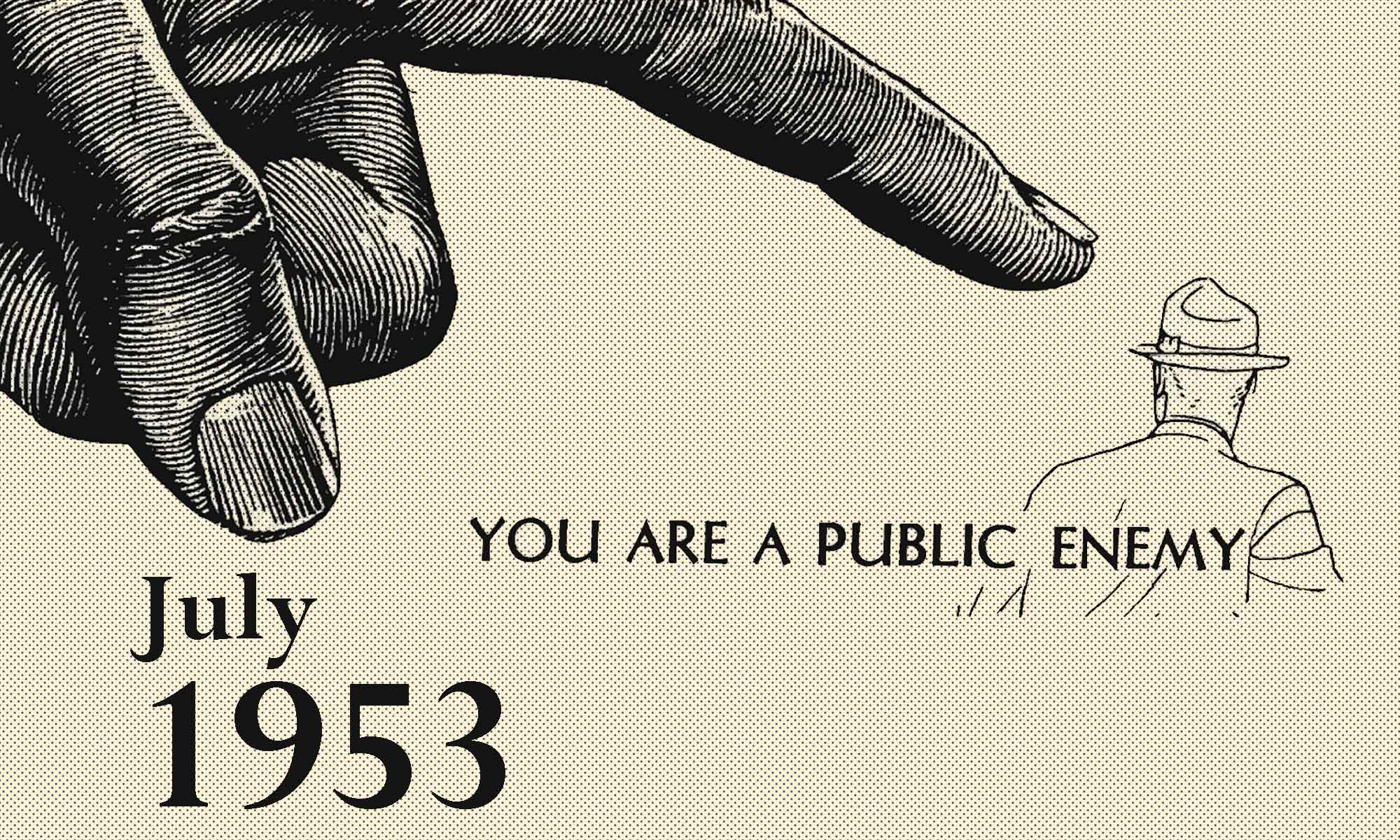| ◄ JULY ► | ||||||
|---|---|---|---|---|---|---|
| ◄ 1953 ► | ||||||
| 1 | 2 | 3 | 4 | |||
| 5 | 6 | 7 | 8 | 9 | 10 | 11 |
| 12 | 13 | 14 | 15 | 16 | 17 | 18 |
| 19 | 20 | 21 | 22 | 23 | 24 | 25 |
| 26 | 27 | 28 | 29 | 30 | 31 | |
| President: | Dwight D. Eisenhower (R) | |||
| Vice-President: | Richard M. Nixon (R) | |||
| House: | 211 (D) | 219 (R) | 1 (Other) | 4 (Vacant) |
| Southern states: | 100 (D) | 6 (R) | ||
| Senate: | 46 (D) | 48 (R) | 1 (Other) | 1 (Vacant) |
| Southern states: | 21 (D) | 1 (Vacant) | ||
| GDP growth: | 5.4% | (Annual) | (Recession of | |
| -0.6% | (Quarterly) | 1953-1954 begins) | ||
| Inflation: | 0.4% | |||
| Unemployment: | 2.6% | |||
| US killed in action, | 1,160 | (This month) | ||
| Korean conflict: | 36,551 | (Since Jun 28, 1950) | ||
![]()
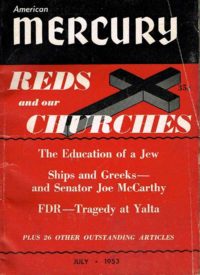 July: The July issue of American Mercury magazine contains an article by J.B. Matthews titled, “Reds and Our Churches,” which begins: “The largest single group supporting the Communist apparatus in the United States today is composed of Protestant Clergymen.” He asserts that “the Communist Party has enlisted the support of at least seven thousand Protestant clergymen in the same categories — party members, fellow-travelers, espionage agents, party-line adherents, and unwitting dupes.” Matthews asks, “Why should they be allowed to participate, without investigation and exposure, in the ‘campaign to disarm and defeat the United States’? The Communist Party counts heavily on this immunity which cowardly politicians would grant to ministers of the Gospel.” Matthews names 117 active and retired bishops and ministers from large cities, small towns and rural areas from coast to coast. Just a week before the magazine came out, Sen. Joseph McCarthy (R-WI), chairman of the Senate Permanent Subcommittee on Investigations, hired Matthews to be the executive staff director for the subcommittee.
July: The July issue of American Mercury magazine contains an article by J.B. Matthews titled, “Reds and Our Churches,” which begins: “The largest single group supporting the Communist apparatus in the United States today is composed of Protestant Clergymen.” He asserts that “the Communist Party has enlisted the support of at least seven thousand Protestant clergymen in the same categories — party members, fellow-travelers, espionage agents, party-line adherents, and unwitting dupes.” Matthews asks, “Why should they be allowed to participate, without investigation and exposure, in the ‘campaign to disarm and defeat the United States’? The Communist Party counts heavily on this immunity which cowardly politicians would grant to ministers of the Gospel.” Matthews names 117 active and retired bishops and ministers from large cities, small towns and rural areas from coast to coast. Just a week before the magazine came out, Sen. Joseph McCarthy (R-WI), chairman of the Senate Permanent Subcommittee on Investigations, hired Matthews to be the executive staff director for the subcommittee.
![]()
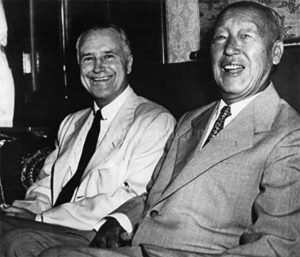 Jul 1: A special U.S. mission headed by Assistant Secretary of State Walter S. Robertson meets with South Korean Syngman Rhee to spell out the final terms the U.S. will offer in return for South Korea’s cooperating on the armistice agreement. They terms include a security pact between the U.S. and South Korea; a promise of economic and military aid; a commitment to have the Rhee government’s voice heard at the political conference to follow the truce; and a pledge that the U.S. will work for the peaceful reunification of Korea. Rhee sticks to his demand that the U.S. supports South Korea if it decides to achieve reunification by force. Says one member of the U.S. mission, “Rhee must learn he is not the Commander in Chief of the United States Army, Navy and Air Force.”
Jul 1: A special U.S. mission headed by Assistant Secretary of State Walter S. Robertson meets with South Korean Syngman Rhee to spell out the final terms the U.S. will offer in return for South Korea’s cooperating on the armistice agreement. They terms include a security pact between the U.S. and South Korea; a promise of economic and military aid; a commitment to have the Rhee government’s voice heard at the political conference to follow the truce; and a pledge that the U.S. will work for the peaceful reunification of Korea. Rhee sticks to his demand that the U.S. supports South Korea if it decides to achieve reunification by force. Says one member of the U.S. mission, “Rhee must learn he is not the Commander in Chief of the United States Army, Navy and Air Force.”
![]()
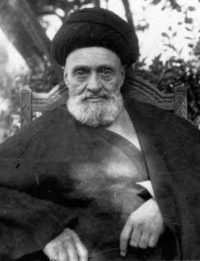 Jul 1: Supporters of Iranian Prime Minister Mohammed Mossadegh ousts Ayatollah Abul-Qasem Kashani as Speaker of the Majlis, and elects a wealthy landlord, Abdullah Moazzami, in his place. Kashani and Mossadegh had been allies when Mossadegh nationalized the Anglo-Iranian Oil Company’s properties in Iran. But after Mossadegh acquired dictatorial powers, Kashami has became a fiery opponent. The weekly anti-Mossadegh newspaper Vahemeh says that Kashami has suggested it might be time to declare a jihad. Another pro-Kashani weekly, Oghab-I-Shargh carries the headline: “The blood of Mossadegh, Moazami and other enemies of freedom is now legal,” meaning that Islamic law makes it legal to assassinate them. The schism among Mossadegh’s supporters makes him increasingly dependent on the outlawed Tudeh (Communist) party for demonstrations of support on the street.
Jul 1: Supporters of Iranian Prime Minister Mohammed Mossadegh ousts Ayatollah Abul-Qasem Kashani as Speaker of the Majlis, and elects a wealthy landlord, Abdullah Moazzami, in his place. Kashani and Mossadegh had been allies when Mossadegh nationalized the Anglo-Iranian Oil Company’s properties in Iran. But after Mossadegh acquired dictatorial powers, Kashami has became a fiery opponent. The weekly anti-Mossadegh newspaper Vahemeh says that Kashami has suggested it might be time to declare a jihad. Another pro-Kashani weekly, Oghab-I-Shargh carries the headline: “The blood of Mossadegh, Moazami and other enemies of freedom is now legal,” meaning that Islamic law makes it legal to assassinate them. The schism among Mossadegh’s supporters makes him increasingly dependent on the outlawed Tudeh (Communist) party for demonstrations of support on the street.
![]()
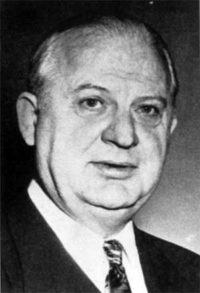 Jul 3: J.B. Matthews’s article, “Reds and Our Churches,” which appears in the July 1953 issue of American Mercury, becomes a political hot potato for Joseph McCarthy’s (R-WI) Senate Permanent Subcommittee on Investigations. As week before that article came out, McCarthy had hired Matthes to serve as the Subcommittee’s executive staff director. Subcommittee member Sen. Charles I. Potter (R-WI), calls for Matthews’s dismissal. He joins three Democratic committee members — John McClellan (AR), Henry “Scoop” Jackson (WA) and Stuart Symington (MO) — who denounce the Matthews article as “a shocking and unwarranted attack” on the American clergy which “cannot be supported by the facts.” Altogether, the four form a majority of the seven-man subcommittee But McCarthy refuses to fire Matthews and says that under the Congressional Reorganization Act of 1946, he has the complete power to hire and fire subcommittee staff members.
Jul 3: J.B. Matthews’s article, “Reds and Our Churches,” which appears in the July 1953 issue of American Mercury, becomes a political hot potato for Joseph McCarthy’s (R-WI) Senate Permanent Subcommittee on Investigations. As week before that article came out, McCarthy had hired Matthes to serve as the Subcommittee’s executive staff director. Subcommittee member Sen. Charles I. Potter (R-WI), calls for Matthews’s dismissal. He joins three Democratic committee members — John McClellan (AR), Henry “Scoop” Jackson (WA) and Stuart Symington (MO) — who denounce the Matthews article as “a shocking and unwarranted attack” on the American clergy which “cannot be supported by the facts.” Altogether, the four form a majority of the seven-man subcommittee But McCarthy refuses to fire Matthews and says that under the Congressional Reorganization Act of 1946, he has the complete power to hire and fire subcommittee staff members.
![]() Jul 4: Religious leaders of major Protestant denominations condemn a magazine article by J.B. Matthews, chief investigator for Sen. Joseph McCarthy’s (R-WI) Permanent Subcommittee on Investigations, which alleges that “at least seven thousand Protestant clergymen (are) party members, fellow-travelers, espionage agents, party-line adherents, and unwitting dupes.” Methodist Bishop William C. Martin, President of the National Council of Churches, says the article “is the revelation of a degree of stupidity and misrepresentation which can be reached only in an atmosphere of suspicion, distrust and fear.” Dr. Franklin C. Fry, president of the United Lutheran Church in America, says that Matthews’s article is “as an unjust attack on the Protestant ministry as it was unprovoked.” Dr. J.D. Grey, immediate past president of the Southern Baptist Convention calls the article “gross generalizations.” But the fundamentalist American Council of Christian Churches says that Matthews should “be honored as a patriot and factual analyst.”
Jul 4: Religious leaders of major Protestant denominations condemn a magazine article by J.B. Matthews, chief investigator for Sen. Joseph McCarthy’s (R-WI) Permanent Subcommittee on Investigations, which alleges that “at least seven thousand Protestant clergymen (are) party members, fellow-travelers, espionage agents, party-line adherents, and unwitting dupes.” Methodist Bishop William C. Martin, President of the National Council of Churches, says the article “is the revelation of a degree of stupidity and misrepresentation which can be reached only in an atmosphere of suspicion, distrust and fear.” Dr. Franklin C. Fry, president of the United Lutheran Church in America, says that Matthews’s article is “as an unjust attack on the Protestant ministry as it was unprovoked.” Dr. J.D. Grey, immediate past president of the Southern Baptist Convention calls the article “gross generalizations.” But the fundamentalist American Council of Christian Churches says that Matthews should “be honored as a patriot and factual analyst.”
![]() Jul 8: The Chinese and North Koreans agree to resume negotiations to work on a final armistice agreement despite the ongoing opposition of South Korean President Syngman Rhee. Meanwhile, talks continue between a U.S. mission headed by Assistant Secretary of State Walter S. Robertson and Rhee in an effort to get Rhee to withdraw his opposition to a truce that would leave Korea divided. The Communists’ willingness to resume final negotiations is seen as strengthening Robertson’s had, since it appears that Rhee will soon have to decide to either go along with the U.N.’s terms or follow through on his threat to fight on alone to almost certain defeat.
Jul 8: The Chinese and North Koreans agree to resume negotiations to work on a final armistice agreement despite the ongoing opposition of South Korean President Syngman Rhee. Meanwhile, talks continue between a U.S. mission headed by Assistant Secretary of State Walter S. Robertson and Rhee in an effort to get Rhee to withdraw his opposition to a truce that would leave Korea divided. The Communists’ willingness to resume final negotiations is seen as strengthening Robertson’s had, since it appears that Rhee will soon have to decide to either go along with the U.N.’s terms or follow through on his threat to fight on alone to almost certain defeat.
![]() Jul 8: Despite reports of renewed strikes in East Germany, the government announces that it is lifting all restrictions on travel between East and West Berlin. It will also restore rapid transit connections between the two sectors.
Jul 8: Despite reports of renewed strikes in East Germany, the government announces that it is lifting all restrictions on travel between East and West Berlin. It will also restore rapid transit connections between the two sectors.
![]() Jul 8: The State Department’s International Information Administration releases a statement addressing the “book burning” controversy that has engulfed the Overseas Book Library Program. The statement calls book burning a “wicked symbolic act” that should not be condoned. The programs revised policy will ensure that controversial books and those critical of the U.S. government will now be acceptable. Also, the program will no longer ban books whose authors have invoked the Fifth Amendment in refusing to answer questions before congressional committees. The statement notes that some books by Communists or their sympathizers have nothing to do with communism — mystery stories, humor anthologies, books on plumbing, for example. The criteria now will be based on content only. Only those books which directly call for the overthrow of the United States will be banned from State Department overseas libraries.
Jul 8: The State Department’s International Information Administration releases a statement addressing the “book burning” controversy that has engulfed the Overseas Book Library Program. The statement calls book burning a “wicked symbolic act” that should not be condoned. The programs revised policy will ensure that controversial books and those critical of the U.S. government will now be acceptable. Also, the program will no longer ban books whose authors have invoked the Fifth Amendment in refusing to answer questions before congressional committees. The statement notes that some books by Communists or their sympathizers have nothing to do with communism — mystery stories, humor anthologies, books on plumbing, for example. The criteria now will be based on content only. Only those books which directly call for the overthrow of the United States will be banned from State Department overseas libraries.
![]() Jul 9: President Eisenhower joins those criticizing J.B. Matthews’s article that appeared in the July 1953 issue of American Mercury. In a telegram yo the co-chairmen of the Commission on Religious Organizations of the National Conference of Christians and Jews, Eisenhower says Matthews’s “attacks portray contempt for the principles of freedom and decency. And when these attacks — whatever their professed purpose be — condemn such a vast portion of the churches or clergy as to create doubt in the loyalty of all, the damage to our nation is multiplied.” Sen. Joseph McCarthy (R-WI) later “very reluctantly” accepts Matthews’s resignation as executive staff director for the Senate Permanent Subcommittee on Investigations.
Jul 9: President Eisenhower joins those criticizing J.B. Matthews’s article that appeared in the July 1953 issue of American Mercury. In a telegram yo the co-chairmen of the Commission on Religious Organizations of the National Conference of Christians and Jews, Eisenhower says Matthews’s “attacks portray contempt for the principles of freedom and decency. And when these attacks — whatever their professed purpose be — condemn such a vast portion of the churches or clergy as to create doubt in the loyalty of all, the damage to our nation is multiplied.” Sen. Joseph McCarthy (R-WI) later “very reluctantly” accepts Matthews’s resignation as executive staff director for the Senate Permanent Subcommittee on Investigations.
![]()
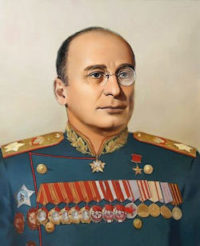 Jul 10: Lavrenti Beria, chief of the Soviet Union’s secret police, is purged from the Soviet High Command and handed over to the Soviet Supreme Court for criminal prosecution. Beria is accused of “criminal anti-party and anti-state actions … to undermine the Soviet state in the interest of foreign capital.” He is accused of trying to restore capitalism to the Soviet Union, of trying to place his Internal Affairs Ministry in a position above the government and Communist Party, and of stirring divisions between Soviet nationalities A Pravda editorial says he has undergone “a bourgeois regeneration” and became an “adventurist and hireling of foreign imperial forces.” Until now, he was believed to be the U.S.S.R.’s number two man, behind Premier Georgi Malenkov, with Foreign Minister Vyacheslav Molotov rounding out the ruling triumvirate. Western observers believe Beria’s influence has contributed to the U.S.S.R.’s more conciliatory measures at home and abroad, and that recent unrest in East Germany and Czechoslovakia may have contributed to his downfall. Rumors of Beria’s downfall began circulating on June 28 when Pravda listed the entire top Soviet leadership, with Beria’s name omitted, as attending the gala premiere of Yuri Shaporin’s opera “The Decembrists” at the Bolshoi Theatre the night before. This is the most important development so far in the post-Stalinist power struggle since Stalin’s death in March.
Jul 10: Lavrenti Beria, chief of the Soviet Union’s secret police, is purged from the Soviet High Command and handed over to the Soviet Supreme Court for criminal prosecution. Beria is accused of “criminal anti-party and anti-state actions … to undermine the Soviet state in the interest of foreign capital.” He is accused of trying to restore capitalism to the Soviet Union, of trying to place his Internal Affairs Ministry in a position above the government and Communist Party, and of stirring divisions between Soviet nationalities A Pravda editorial says he has undergone “a bourgeois regeneration” and became an “adventurist and hireling of foreign imperial forces.” Until now, he was believed to be the U.S.S.R.’s number two man, behind Premier Georgi Malenkov, with Foreign Minister Vyacheslav Molotov rounding out the ruling triumvirate. Western observers believe Beria’s influence has contributed to the U.S.S.R.’s more conciliatory measures at home and abroad, and that recent unrest in East Germany and Czechoslovakia may have contributed to his downfall. Rumors of Beria’s downfall began circulating on June 28 when Pravda listed the entire top Soviet leadership, with Beria’s name omitted, as attending the gala premiere of Yuri Shaporin’s opera “The Decembrists” at the Bolshoi Theatre the night before. This is the most important development so far in the post-Stalinist power struggle since Stalin’s death in March.
![]() Jul 10: The U.N. and Communist truce delegations resume meetings at Panmunjom despite fierce opposition from South Korean President Syngman Rhee. The Chinese and North Korean delegations seek an Allied guarantee that Rhee will comply with the armistice. All other points of the armistice have already been agreed upon, and all that was left was for lower-level delegations to finish minor details on the English, Korean and Chinese translations, when Rhee unilaterally released 27,000 North Korean prisoners in an attempt to scuttle the armistice.
Jul 10: The U.N. and Communist truce delegations resume meetings at Panmunjom despite fierce opposition from South Korean President Syngman Rhee. The Chinese and North Korean delegations seek an Allied guarantee that Rhee will comply with the armistice. All other points of the armistice have already been agreed upon, and all that was left was for lower-level delegations to finish minor details on the English, Korean and Chinese translations, when Rhee unilaterally released 27,000 North Korean prisoners in an attempt to scuttle the armistice.
![]() Jul 12: South Korean president Synman Rhee and the U.S. State Department release a joint statement signaling Rhee’s unenthusiastic acceptance of a Korean armistice. The agreement comes after President Eisenhower offers security guarantees to South Korea and has advanced negotiations for an alliance to be signed after the armistice is signed.
Jul 12: South Korean president Synman Rhee and the U.S. State Department release a joint statement signaling Rhee’s unenthusiastic acceptance of a Korean armistice. The agreement comes after President Eisenhower offers security guarantees to South Korea and has advanced negotiations for an alliance to be signed after the armistice is signed.
![]()
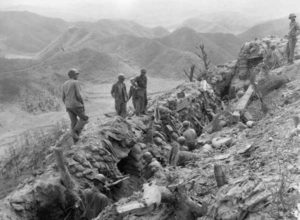 Jul 12: American troops pull off of Porkchop Hill, about forty miles north of Seoul, after five days of bitter fighting. Meanwhile the air war intensifies as U.S. Sabres shoot down four MiGs.
Jul 12: American troops pull off of Porkchop Hill, about forty miles north of Seoul, after five days of bitter fighting. Meanwhile the air war intensifies as U.S. Sabres shoot down four MiGs.
![]() Jul 12: A Transocean DC-6 traveling from Guam to Oakland, California, with scheduled stops at Wake Island and Honolulu, crashes into the Pacific Ocean, killing all 58 passengers and crew on board. The crash occurs about two hours after taking off from Wake Island for the nine-hour flight to Honolulu. Floating oil, debris, a life raft and fourteen bodies are discovered the next day about 340 miles east of Wake Island. Because the fuselage is never recovered, the Civil Aeronautics Safety Bureau will be unable to determine the cause of the crash. This is the first trans-Pacific commercial airline accident since World War II.
Jul 12: A Transocean DC-6 traveling from Guam to Oakland, California, with scheduled stops at Wake Island and Honolulu, crashes into the Pacific Ocean, killing all 58 passengers and crew on board. The crash occurs about two hours after taking off from Wake Island for the nine-hour flight to Honolulu. Floating oil, debris, a life raft and fourteen bodies are discovered the next day about 340 miles east of Wake Island. Because the fuselage is never recovered, the Civil Aeronautics Safety Bureau will be unable to determine the cause of the crash. This is the first trans-Pacific commercial airline accident since World War II.
![]()
 Jul 13: American F-86 Sabres shoot down seven more MiGs over Korea as U.N. bombers take out bridges and roads near the Chinese border. Allied troops also recapture Finger Ridge on the east-central front.
Jul 13: American F-86 Sabres shoot down seven more MiGs over Korea as U.N. bombers take out bridges and roads near the Chinese border. Allied troops also recapture Finger Ridge on the east-central front.
![]() Jul 14: In the biggest Communist offensive in two years, more than 80,000 Chinese troops attack South Korean defenses along the central front. The attack sends Allied defenses back as much as four miles in some places. Meanwhile in Panmunjom, Communist delegates say they are dissatisfied with South Korean President Syngman Rhee’s pledge not to oppose an armistice and demand a more ironclad guarantee.
Jul 14: In the biggest Communist offensive in two years, more than 80,000 Chinese troops attack South Korean defenses along the central front. The attack sends Allied defenses back as much as four miles in some places. Meanwhile in Panmunjom, Communist delegates say they are dissatisfied with South Korean President Syngman Rhee’s pledge not to oppose an armistice and demand a more ironclad guarantee.
![]()
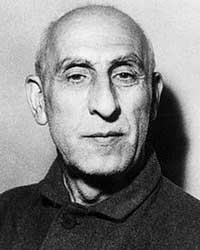 Jul 14: Iranian Prime Minister Mohammed Mossadegh puts an end to any threats to his rule from the Majlis by inducing the twenty-seven members of his National Movement faction to resign. This move denies the Majlis a quorum, rendering it effectively defunct. Mossadegh had been given full legislative powers a year ago, but the Majlis could still meet, pass its own legislation simultaneously or even remove Mossadegh through a vote of no confidence. But now that Iran is without a working parliament, Mossadegh is largely free to rule at will.
Jul 14: Iranian Prime Minister Mohammed Mossadegh puts an end to any threats to his rule from the Majlis by inducing the twenty-seven members of his National Movement faction to resign. This move denies the Majlis a quorum, rendering it effectively defunct. Mossadegh had been given full legislative powers a year ago, but the Majlis could still meet, pass its own legislation simultaneously or even remove Mossadegh through a vote of no confidence. But now that Iran is without a working parliament, Mossadegh is largely free to rule at will.
![]() Jul 16: U.N. troops launch a massive counterattack to take back territory overrun by Chinese and North Korean troops over the past four days. The American Eighth Army fights back a Chinese offensive intended to take the Kumhwa Valley, which leads directly to Seoul. Meanwhile in Panmunjom, the U.N. delegation tells the Communists that they have all of the pledges they need that South Korean President Syngman Rhee will abide by the armistice agreement.
Jul 16: U.N. troops launch a massive counterattack to take back territory overrun by Chinese and North Korean troops over the past four days. The American Eighth Army fights back a Chinese offensive intended to take the Kumhwa Valley, which leads directly to Seoul. Meanwhile in Panmunjom, the U.N. delegation tells the Communists that they have all of the pledges they need that South Korean President Syngman Rhee will abide by the armistice agreement.
![]()
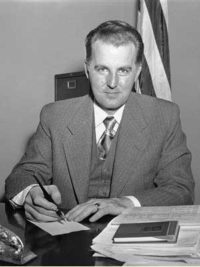 Jul 16: Rep. Harold Velde (R-IL), chairman of the House Un-American Activities Committee, says that J.B. Matthews should have an opportunity to testify before the committee about his charges of communist infiltration of the clergy. Matthews, who was forced to resign as executive staff director for Sen. Joseph McCarthy’s (R-WI) Investigations Subcommittee, has charged in a magazine article published this month that “the Communist Party has enlisted the support of at least seven thousand Protestant clergymen.” Velde had previously suggested that his committee might investigate alleged communist infiltration of churches.
Jul 16: Rep. Harold Velde (R-IL), chairman of the House Un-American Activities Committee, says that J.B. Matthews should have an opportunity to testify before the committee about his charges of communist infiltration of the clergy. Matthews, who was forced to resign as executive staff director for Sen. Joseph McCarthy’s (R-WI) Investigations Subcommittee, has charged in a magazine article published this month that “the Communist Party has enlisted the support of at least seven thousand Protestant clergymen.” Velde had previously suggested that his committee might investigate alleged communist infiltration of churches.
![]() Jul 19: With South Korean, American, and other U.N. troops recovering much of the ground lost in a week of fighting, the Communist delegation at Panmunjom signals that it is prepared to sign an armistice.
Jul 19: With South Korean, American, and other U.N. troops recovering much of the ground lost in a week of fighting, the Communist delegation at Panmunjom signals that it is prepared to sign an armistice.
![]() Jul 21: The U.S. Justice Department releases its latest subversives list, naming twenty organizations as alleged totalitarian, fascist, communist or other so-called subversive groups. Among the new organizations added are legal defense committees for people being persecuted under the Smith Act. Among those groups listed are legal defense fundraising committees for civil rights activist Marie Richardson, civil rights attorney Maurice Braverman, and labor leader Harry Bridges.
Jul 21: The U.S. Justice Department releases its latest subversives list, naming twenty organizations as alleged totalitarian, fascist, communist or other so-called subversive groups. Among the new organizations added are legal defense committees for people being persecuted under the Smith Act. Among those groups listed are legal defense fundraising committees for civil rights activist Marie Richardson, civil rights attorney Maurice Braverman, and labor leader Harry Bridges.
![]() Jul 21: The Christian Science Monitor reports that of seventy-four teachers, professors and students who invoked the Fifth Amendment in questioning before the House Un-American Activities Committee in the past ten months, thirty have been dismissed and eight have resigned. Dismissal actions have been started against two. Twelve have been suspended and twelve cases are still pending. Only ten have been retained.
Jul 21: The Christian Science Monitor reports that of seventy-four teachers, professors and students who invoked the Fifth Amendment in questioning before the House Un-American Activities Committee in the past ten months, thirty have been dismissed and eight have resigned. Dismissal actions have been started against two. Twelve have been suspended and twelve cases are still pending. Only ten have been retained.
![]()
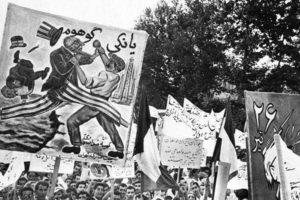 Jul 21: One hundred thousand Iranian demonstrators of the banned Tudeh (Communist) party fill the streets of Tehran. The demonstrations dwarf the five thousand or so supporters of Prime Minister Mohammed Mossadegh earlier in the day. Both demonstrations were called to commemorate the anniversary of the riots that returned Mossadegh to power. Mossadegh has benefited from Tudeh supporters throughout his two-year tumultuous government, but he has generally kept the party at arms length so as to not alienate the country’s powerful mullahs. Today’s demonstration shows that the party can no longer be ignored. It also alarms many of Mossadegh’s more conservative supporters who fear the Tudeh’s rising influence under Mossadegh’s government.
Jul 21: One hundred thousand Iranian demonstrators of the banned Tudeh (Communist) party fill the streets of Tehran. The demonstrations dwarf the five thousand or so supporters of Prime Minister Mohammed Mossadegh earlier in the day. Both demonstrations were called to commemorate the anniversary of the riots that returned Mossadegh to power. Mossadegh has benefited from Tudeh supporters throughout his two-year tumultuous government, but he has generally kept the party at arms length so as to not alienate the country’s powerful mullahs. Today’s demonstration shows that the party can no longer be ignored. It also alarms many of Mossadegh’s more conservative supporters who fear the Tudeh’s rising influence under Mossadegh’s government.
![]()
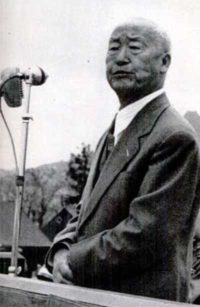 Jul 22: South Korean President Syngman Rhee once again threatens to torpedo an imminent armistice agreement. He tells reporters that he is still waiting on assurances that the U.S. will unilaterally, independent of the U.N., re-enter the war alongside South Korea to reunify the peninsula if the U.N.’s political conference fails to make progress after ninety days. The political conference will begin between the the U.N., China, North Korea and South Korea after the armistice is signed. Washington has refused to extend such assurances. Rhee’s comments directly contradict assurances that U.S. Gen. William Harrison gave to the Communist delegation at Panmunjom.
Jul 22: South Korean President Syngman Rhee once again threatens to torpedo an imminent armistice agreement. He tells reporters that he is still waiting on assurances that the U.S. will unilaterally, independent of the U.N., re-enter the war alongside South Korea to reunify the peninsula if the U.N.’s political conference fails to make progress after ninety days. The political conference will begin between the the U.N., China, North Korea and South Korea after the armistice is signed. Washington has refused to extend such assurances. Rhee’s comments directly contradict assurances that U.S. Gen. William Harrison gave to the Communist delegation at Panmunjom.
![]()
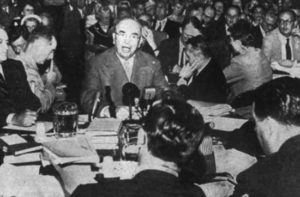 Jul 22: Methodist Bishop G. Bromley Oxnam spends nine hours before the House Un-American Activities Committee, accusing the body of releasing derogatory reports about him from their files without HUAC’s acceptance of responsibility or concern for the reports’ inaccuracies. “It gives rise to a new and vicious expression of ku-kluxism,” says the bishop, “in which an innocent person may be beaten by unknown assailants who are cloaked in anonymity and at times immunity.” The immunity he refers to is the constitutional immunity given for statements made on the floor of the House and Senate. Oxnam specifically calls out Rep. Donald L. Jackson (R-CA), who said on the House floor, that Oxnam “served God on Sundays but Communist fronts the rest of the week.” Oxnam demands an apology and declares, “We cannot beat down the Communist menace by bearing false witness against fellow Americans.”
Jul 22: Methodist Bishop G. Bromley Oxnam spends nine hours before the House Un-American Activities Committee, accusing the body of releasing derogatory reports about him from their files without HUAC’s acceptance of responsibility or concern for the reports’ inaccuracies. “It gives rise to a new and vicious expression of ku-kluxism,” says the bishop, “in which an innocent person may be beaten by unknown assailants who are cloaked in anonymity and at times immunity.” The immunity he refers to is the constitutional immunity given for statements made on the floor of the House and Senate. Oxnam specifically calls out Rep. Donald L. Jackson (R-CA), who said on the House floor, that Oxnam “served God on Sundays but Communist fronts the rest of the week.” Oxnam demands an apology and declares, “We cannot beat down the Communist menace by bearing false witness against fellow Americans.”
![]()
 Jul 23: South Korean president Syngman Rhee escalates his verbal campaign against an imminent armistice to end the fighting in Korea. He says that promises made to him by the United States have been broken at Panmunjom. The Chinese and North Koreans publicly demand new guarantees that South Korea will abide by the terms of the negotiated truce, but privately seem willing to accept the United Nation Command’s assurances that South Korea will go along with it. Communist workers in Panmunjom are continuing to build the Truce Hut in which the Korean armistice is to be signed.
Jul 23: South Korean president Syngman Rhee escalates his verbal campaign against an imminent armistice to end the fighting in Korea. He says that promises made to him by the United States have been broken at Panmunjom. The Chinese and North Koreans publicly demand new guarantees that South Korea will abide by the terms of the negotiated truce, but privately seem willing to accept the United Nation Command’s assurances that South Korea will go along with it. Communist workers in Panmunjom are continuing to build the Truce Hut in which the Korean armistice is to be signed.
![]() Jul 23: The film Gentlemen Prefer Blondes is released. It stars Jane Russel and Marilyn Monroe, and feature’s Monroe’s rendition of “Diamonds Are a Girl’s Best Friend.”
Jul 23: The film Gentlemen Prefer Blondes is released. It stars Jane Russel and Marilyn Monroe, and feature’s Monroe’s rendition of “Diamonds Are a Girl’s Best Friend.”
![]()
 Jul 26: About 160 Cuban revolutionaries attack the Moncada Barracks in the southeastern Cuba city of Santiago de Cuba. The rebels are outnumbered ten to one. Fifteen soldiers and three policemen are killed. Nine rebels are killed in the fighting, and another fifty-two are captured and shot over the next three days. The band’s leader, Fidel Castro, is captured. He will be sentenced to fifteen years’ imprisonment, but will be released in 1953. Cuban dictator Fulgencio Batista suspends Constitutional guarantees and imposes martial law. Castro will rename his revolutionary movement Movimiento 26 Julio or M-26-7. After Castro comes to power, it will become a national holiday.
Jul 26: About 160 Cuban revolutionaries attack the Moncada Barracks in the southeastern Cuba city of Santiago de Cuba. The rebels are outnumbered ten to one. Fifteen soldiers and three policemen are killed. Nine rebels are killed in the fighting, and another fifty-two are captured and shot over the next three days. The band’s leader, Fidel Castro, is captured. He will be sentenced to fifteen years’ imprisonment, but will be released in 1953. Cuban dictator Fulgencio Batista suspends Constitutional guarantees and imposes martial law. Castro will rename his revolutionary movement Movimiento 26 Julio or M-26-7. After Castro comes to power, it will become a national holiday.
![]()
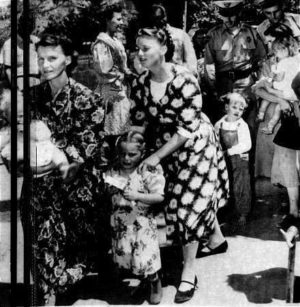 Jul 26: Arizona Gov. John Pyle declares an unusual state of insurrection so he can send 120 lawmen to raid the remote settlement Short Creek on the Utah border. Short Creek, a tiny hamlet largely cut off from the rest of the world, is home to the Council of Friends, a polygamous Mormon sect. Pyle’s avowed objective is the arrest the thirty-six men and eighty-six women, and find new homes for the children — some of whom are child brides. Surprisingly, most Americans, disturbed at the images of children being separated from their mothers, see the raid as a totalitarian act against religious freedom. The resulting backlash will destroy Pyle’s political career the following year and lead to a hands-off policy for the next fifty years. The families will eventually be reunited and the community will change its name to Colorado City, Arizona and Hildale, Utah. The religious sect will later become the Fundamentalist Church of Jesus Christ of Latter-Day Saints under Rulon Jeffs and Warren Jeffs.
Jul 26: Arizona Gov. John Pyle declares an unusual state of insurrection so he can send 120 lawmen to raid the remote settlement Short Creek on the Utah border. Short Creek, a tiny hamlet largely cut off from the rest of the world, is home to the Council of Friends, a polygamous Mormon sect. Pyle’s avowed objective is the arrest the thirty-six men and eighty-six women, and find new homes for the children — some of whom are child brides. Surprisingly, most Americans, disturbed at the images of children being separated from their mothers, see the raid as a totalitarian act against religious freedom. The resulting backlash will destroy Pyle’s political career the following year and lead to a hands-off policy for the next fifty years. The families will eventually be reunited and the community will change its name to Colorado City, Arizona and Hildale, Utah. The religious sect will later become the Fundamentalist Church of Jesus Christ of Latter-Day Saints under Rulon Jeffs and Warren Jeffs.
![]()
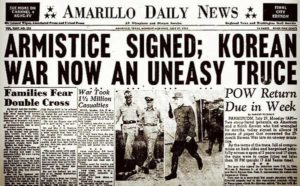 Jul 27: The U.N., People’s Republic of China and North Korea sign an armistice at Panmunjom, bringing an end to three years of fighting. Nine copes of the armistice are signed: three in English, three in Korean, and three in Chinese. The armistice is signed at 10:01 a.m. local time, and is set to go into effect twelve hours later. Seventy-two hours after the signing, the troops will withdraw two kilometers from the fighting line and a neutral zone will be established between the two armies. Peiping (Beijing) Radio calls the truce “a glorious victory.” President Eisenhower says it is “one step nearer” to world peace, but cautions that we “must be vigilant against the possibility of untoward developments.” South Korean President Syngman Rhee, who is not a signatory to the armistice, pledges to observe the truce “for a limited time.” Nobody believes it will last very long.
Jul 27: The U.N., People’s Republic of China and North Korea sign an armistice at Panmunjom, bringing an end to three years of fighting. Nine copes of the armistice are signed: three in English, three in Korean, and three in Chinese. The armistice is signed at 10:01 a.m. local time, and is set to go into effect twelve hours later. Seventy-two hours after the signing, the troops will withdraw two kilometers from the fighting line and a neutral zone will be established between the two armies. Peiping (Beijing) Radio calls the truce “a glorious victory.” President Eisenhower says it is “one step nearer” to world peace, but cautions that we “must be vigilant against the possibility of untoward developments.” South Korean President Syngman Rhee, who is not a signatory to the armistice, pledges to observe the truce “for a limited time.” Nobody believes it will last very long.
![]() Jul 28: U.S. Secretary of State John Foster Dulles holds a press conference and tells reporters, “The growing activities of the illegal Communist Party in Iran and the toleration of them by the Iranian Government has caused our Government concern. These developments make it more difficult to grant aid to Iran.” This statement reiterates President Eisenhower’s June 29 letter to Iranian Prime Minister Mohammed Mossadegh saying that further American foreign aid will not be available.
Jul 28: U.S. Secretary of State John Foster Dulles holds a press conference and tells reporters, “The growing activities of the illegal Communist Party in Iran and the toleration of them by the Iranian Government has caused our Government concern. These developments make it more difficult to grant aid to Iran.” This statement reiterates President Eisenhower’s June 29 letter to Iranian Prime Minister Mohammed Mossadegh saying that further American foreign aid will not be available.
![]()
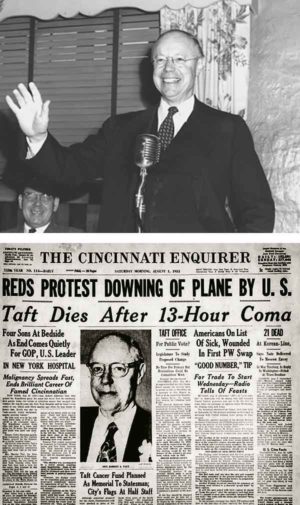 Jul 31: Senate Majority Leader Robert A. Taft (R-OH), dies of pancreatic cancer at the age of 63. He has been in a New York hospital since July 4. The nature of his illness wasn’t disclosed until his death. The death of “Mr. Republican” rocks the country and especially the GOP, which saw him as a vital bridge between the internationalist East Coast and isolationist Midwestern Republicans.
Jul 31: Senate Majority Leader Robert A. Taft (R-OH), dies of pancreatic cancer at the age of 63. He has been in a New York hospital since July 4. The nature of his illness wasn’t disclosed until his death. The death of “Mr. Republican” rocks the country and especially the GOP, which saw him as a vital bridge between the internationalist East Coast and isolationist Midwestern Republicans.
![[Emphasis Mine]](http://jimburroway.com/wp-content/uploads/2018/02/Witnesses.jpg)
